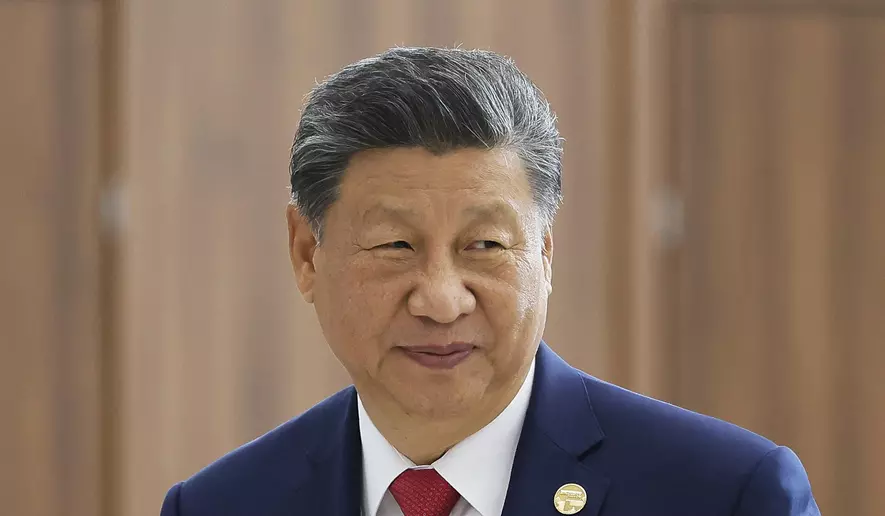In a bold and unwavering New Year’s address, Chinese President Xi Jinping reaffirmed China’s commitment to achieving reunification with Taiwan, stating that “no one can stop” this historic process. Xi’s declaration reflects Beijing’s intensifying rhetoric and military actions toward the self-governing island, further escalating tensions in the region and drawing global attention.
A Renewed Push for Reunification
Xi framed reunification as a cornerstone of China’s national rejuvenation and a deeply held aspiration shared by people on both sides of the Taiwan Strait.
“The complete reunification of our motherland is an aspiration shared by people on both sides of the Strait,” Xi said. “It is inevitable and integral to the great rejuvenation of the Chinese nation.”
The Chinese president emphasized familial and cultural bonds between mainland China and Taiwan, portraying reunification as a domestic matter. However, his assertive tone underscores Beijing’s impatience with the current state of cross-strait relations, particularly following Taiwan’s recent presidential election.
Heightened Military Activities
Over the past year, China has ramped up its military presence near Taiwan, conducting frequent exercises that Beijing has described as warnings to separatist forces. These actions include large-scale naval drills, simulated blockades, and repeated incursions into Taiwan’s air defense identification zone (ADIZ).
Observers have noted that these operations are designed to test Taiwan’s defenses and signal China’s readiness to use force if necessary. Some analysts view the military maneuvers as a way for Beijing to apply pressure on Taiwan’s leadership while sending a message to the United States and its allies about China’s resolve.
A Strained Cross-Strait Relationship
Taiwan’s newly elected president, Lai Ching-te, has long been viewed by Beijing as a pro-independence figure. Lai’s victory has further strained relations, with Chinese officials accusing him of undermining peace and stability in the region. In response, Beijing has doubled down on its narrative that Taiwan’s future is non-negotiable and that any moves toward formal independence will be met with decisive action.
Despite China’s rhetoric, Taiwan’s government has remained steadfast in asserting its sovereignty. President Lai has reiterated that the island’s future should be determined by its 23 million residents, not external forces.
“Taiwan’s commitment to democracy and freedom is unwavering,” Lai said in a recent statement. “We seek peace and stability across the Taiwan Strait, but we will not compromise on our right to self-determination.”
International Implications
Xi’s remarks have heightened concerns among global powers about the stability of the Asia-Pacific region. The United States, Taiwan’s principal arms supplier and unofficial ally, has reiterated its commitment to supporting Taiwan’s self-defense capabilities. U.S. arms sales to Taiwan, including advanced missile systems and fighter jets, have drawn sharp criticism from Beijing, which views such actions as interference in its domestic affairs.
The Biden administration has consistently emphasized the importance of peace and stability in the Taiwan Strait. However, Xi’s latest declaration raises questions about how far China might go to achieve its goal of reunification and how the international community, particularly the U.S. and its allies, will respond.
Economic and Diplomatic Calculations
China’s aggressive stance on Taiwan comes at a time when its economy is grappling with significant challenges, including slowing growth and rising debt levels. Analysts suggest that Beijing’s focus on Taiwan may serve as a way to bolster domestic nationalism and divert attention from economic strains.
Meanwhile, Xi has strengthened diplomatic ties with key allies, including Russia. In his New Year’s address, he praised Russian President Vladimir Putin as a reliable partner, signaling the growing alignment between the two nations amid tensions with Western powers.
A High-Stakes Year Ahead
As 2025 begins, the situation across the Taiwan Strait remains precarious. Xi’s unequivocal statements leave little doubt about Beijing’s determination to pursue reunification, whether through peaceful means or coercion. Meanwhile, Taiwan’s leadership continues to advocate for democratic values and self-determination, further solidifying its stance against Beijing’s pressure.
The coming year will likely see increased military activities, diplomatic maneuvers, and strategic calculations by both sides. For now, Xi’s forceful rhetoric serves as a stark reminder of the high stakes involved in one of the world’s most volatile geopolitical flashpoints.
Key Takeaways
- Chinese President Xi Jinping declared Taiwan’s reunification with China as “inevitable” in his New Year’s address.
- China has ramped up military activities near Taiwan, including naval drills and airspace incursions, as a show of strength.
- Taiwan’s government, led by newly elected President Lai Ching-te, has reaffirmed its commitment to democracy and self-determination.
- The United States has reiterated its support for Taiwan, drawing sharp criticism from Beijing.
- Xi’s remarks underscore China’s growing assertiveness in the region, raising concerns about potential conflict in the Asia-Pacific.
This ongoing geopolitical saga highlights the fragile balance between China’s ambitions, Taiwan’s sovereignty, and the broader implications for global stability.

